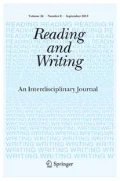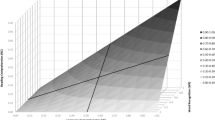Abstract
A battery of predictor measures (neuromotor, orthographic, visual-motor integration, syllable and phoneme segmentation, word finding, sentence syntax, reading, and verbal intelligence) and of writing criterion measures (handwriting, spelling, and composition) was administered to an equal number of girls and boys in the first, second, and third grades (N=30) to study the developmental skills children bring to the task of learning to write. This developmental approach is an important complement to the prevailing process and product approaches to writing research. Multiple regression and canonical correlation results supported thehypothesis that lower-level developmental variables are related to beginning writing skills. Rapid, automatic production of alphabet letters, rapid coding of orthographic information, and speed of sequential finger movement were the best predictors of handwriting and composition skills. Orthographic-phonological mappings and visual-motor integration were the best predictors of spelling. Canonical correlation analysis identified anorthographic-linguistic dimension and anautomaticity dimension in the battery of developmental skills and of writing products. Results also supported the hypothesis that the translation component in process models of writing has two separable sub-components — text generation and transcription. Lower-level developmental skills are thought to constrain the transcription sub-component.
Similar content being viewed by others
References
Beal, C. R. (1989). Children's communication skills: Implications for the development of writing strategies. In: C. B. McCormick, G. Miller and M. Pressley (eds.),Cognitive strategy research: From basic research to educational applications, pp. 191–214. New York: Springer Verlag.
Beery, K. E. (1982).Revised administration, scoring, and teaching manual for the Developmental Test of Visual-Motor Integration. Cleveland, OH: Modern Curriculum Press.
Bereiter, C., Burtis, P. and Scardamalia, M. (1988). Cognitive operations in constructing main points in written composition.Journal of Memory and Language 27: 261–278.
Berninger, V. (1991). Overview of ‘Bridging the gap between developmental, neuropsychological, and cognitive approaches to reading’.Learning and Individual Differences 3: 163–179.
Berninger, V. (1990). Multiple orthographic codes: Key to alternative instructional methodologies for developing orthographic-phonological connections underlying word identification.School Psychology Review 19: 518–533.
Berninger, V. (1987). Global, component, and serial processing of printed words in beginning readers.Journal of Experimental Child Psychology 43: 387–418.
Berninger, V. and Abbott, R. (in press). Unit of analysis and constructive processes of the learner: Key concepts for educational neuropsychology.Educational Psychologist.
Berninger, V. and Colwell, S. (1985). Relationships between neurodevelopmental and educational findings.Pediatrics 75: 697–702.
Berninger, V. and Hart, T. (April 1991). A developmental neuropsychological perspective for reading and writing acquisition. American Educational Research Association. Also, in press inEducational Psychologist.
Berninger, V., Mizokawa, D. and Bragg, R. (1991). Theory-based diagnosis and remediation of writing disabilities.Journal of School Psychology 29: 57–79.
Berninger, V., Thalberg, S., DeBruyn, I. and Smith, R. (1987). Preventing reading disabilities by assessing and remediating phonemic skills.School Psychology Review 16: 554–565.
Berninger, V., Yates, C. and Lester, K. (1991). Multiple orthographic codes in reading and writing acquisition.Reading and Writing 3: 115–149.
Carroll, J., Davies, P. and Richman, B. (1971).American heritage word frequency book. Boston: Houghton Mifflin.
Clay, M. M. (1971). Sentence repetition: Elicited imitation of a controlled set of syntactic structures by four language groups.Monographs of the Society for Research in Child Development 36(3).
Connolly, K. and Stratton, P. (1968). Developmental changes in associated movements.Developmental Medicine and Child Neurology 10: 49–56.
Denckla, M. (1974). Development of motor coordination in normal children.Developmental Medicine and Child Neurology 16: 729–741.
Ehri, L. (1980). The role of orthographic images in learning printed words. In: J. F. Kavanaugh and R. L. Venezky (eds.),Orthography, reading, and dyslexia, pp. 155–170. Baltimore: University Park Press.
Englert, C., Stewart, S. and Hiebert, E. (1988). Young writer's use of text structure in expository text generation.Journal of Educational Psychology 80: 143–151.
Fitzgerald, J. (1987). Research on revision in writing.Review of Educational Research 57: 481–506.
Fletcher, J., Taylor, H., Morris, R. and Satz, P. (1982). Finger recognition skills and reading achievement: A developmental neuropsychological analysis.Developmental Psychology 18: 124–132.
Gibson, E., Osser, H. and Pick, A. (1963). A study of the development of grapheme-phoneme correspondence.Journal of Verbal Learning and Verbal Behavior 2: 142–146.
Glushko, R. (1979). The organization and activation of orthographic knowledge in reading aloud.Journal of Experimental Psychology: Human Perception and Performance 5: 674–691.
Graves, D. H. (1975). An examination of the writing processes of seven year old children.Research in the Teaching of English 9: 227–241.
Hayes, J. and Flower, L. (1980). Identifying the organization of the writing processes. In: L. W. Gregg and E. R. Steinberg (eds.),Cognitive process in writing, pp. 3–30. Hillsdale, NJ: Erlbaum.
Jastak, S. and Wilkinson, G. (1984).Wide range achievement test-revised. Wilmington, DE: Jastak Associates.
Kosslyn, S. (1988). Aspects of a cognitive neuroscience of mental imagery.Science 240: 1621–1626.
Liberman, I., Shankweiler, D., Fischer, F. and Carter, B. (1974). Explicit syllable and phoneme segmentation in the young child.Journal of Experimental Child Psychology 18: 201–212.
Luria, A. R. (1973).The working brain. New York: Basic Books.
McCarthy, D. A. (1972).Manual for the McCarthy scales of children's abilities. San Antonio: The Psychological Corporation.
McCutchen, D. (1986). Domain knowledge and linguistic knowledge in the development of writing ability.Journal of Memory and Language 25: 431–444.
Monroe, M. and Sherman, E. (1966).Group diagnostic reading aptitude and achievement tests. Bradenton, FL: C. H. Nevins Printing Co.
Olson, R., Wise, B., Conners, F. and Rack, J. (in press). Organization, heritability, and remediation of component word recognition and language skills in disabled readers. In: T. H. Carr and B. A. Levy (eds.),Reading and its development: Component skills approaches. New York: Academic Press.
Perfetti, C. (1985).Reading ability. New York: Oxford University Press.
Perfetti, C. and McCutchen, D. (1987). Schooled language competence: Linguistic abilities in reading and writing. In: S. Rosenberg (ed.),Advances in applied psycholinguistics, Vol. 2, pp. 105–141. New York: Cambridge Press.
Sattler, J. (1988).Assessment of children, 3rd ed. San Diego, CA: Jerome M. Sattler Publisher.
Scarborough, H. (1990). Very early language deficits in dyslexic children.Child Development 61: 1728–1743.
Scardamalia, M. and Bereiter, C. (1986). Research on written composition. In: M. C. Wittrock (ed.),Handbook on research on teaching, 3rd ed., pp. 778–803. New York: Macmillan.
Stanovich, K., West, R. and Cunningham, A. (1991). Beyond phonological processes: Print exposure and orthographic processing. In: S. Brady and D. Shankweiler (eds.),Phonological processes in literacy. Hillsdale, NJ: Erlbaum.
Thorndike, R. L., Hagen, E. P. and Sattler, J. M. (1986).Guide for administering and scoring the Stanford-Binet intelligence scale, 4th ed. Chicago: Riverside Publishing.
US Bureau of the Census (1989).Statistical Abstract of the US. 109th ed. Washington, DC.
Vellutino. F. (1979).Dyslexia: Theory and research. Cambridge, MA: MIT Press.
Vellutino, F., Scanlon, D. and Tanzman, M. (1991). Bridging the gap between cognitive and neuropsychological conceptualizations of reading disability.Learning and Individual Differences 3: 181–203.
Wechsler, D. (1974).Manual for the Wechsler intelligence scale for children—revised. San Antonio: The Psychological Corporation.
Wolf, M., Bally, H. and Morris, R. (1986). Automaticity retrieval processes, and reading: A longitudinal study in average and impaired readers.Child Development 57: 988–1000.
Wolff, P. H., Gunnoe, C. and Cohen, C. (1983). Associated movements as a measure of developmental age.Developmental Medicine & Child Neurology 25: 417–429.
Woodcock, R. W. and Johnson, M. B. (1990).The Woodcock-Johnson Psychoeducational Battery: Revised. Allen, TX: DLM Teaching Resources.
Woodcock, R. (1987).Woodcock Reading Mastery Tests-Revised. Circle Pines, MN: American Guidance Service.
Wright, R. and Rosenberg, S. (April 1989).Metacognitive aspects of expository writing. Society for Research in Child Development, Kansas City, MO.
Author information
Authors and Affiliations
Rights and permissions
About this article
Cite this article
Berninger, V., Yates, C., Cartwright, A. et al. Lower-level developmental skills in beginning writing. Read Writ 4, 257–280 (1992). https://doi.org/10.1007/BF01027151
Issue Date:
DOI: https://doi.org/10.1007/BF01027151




